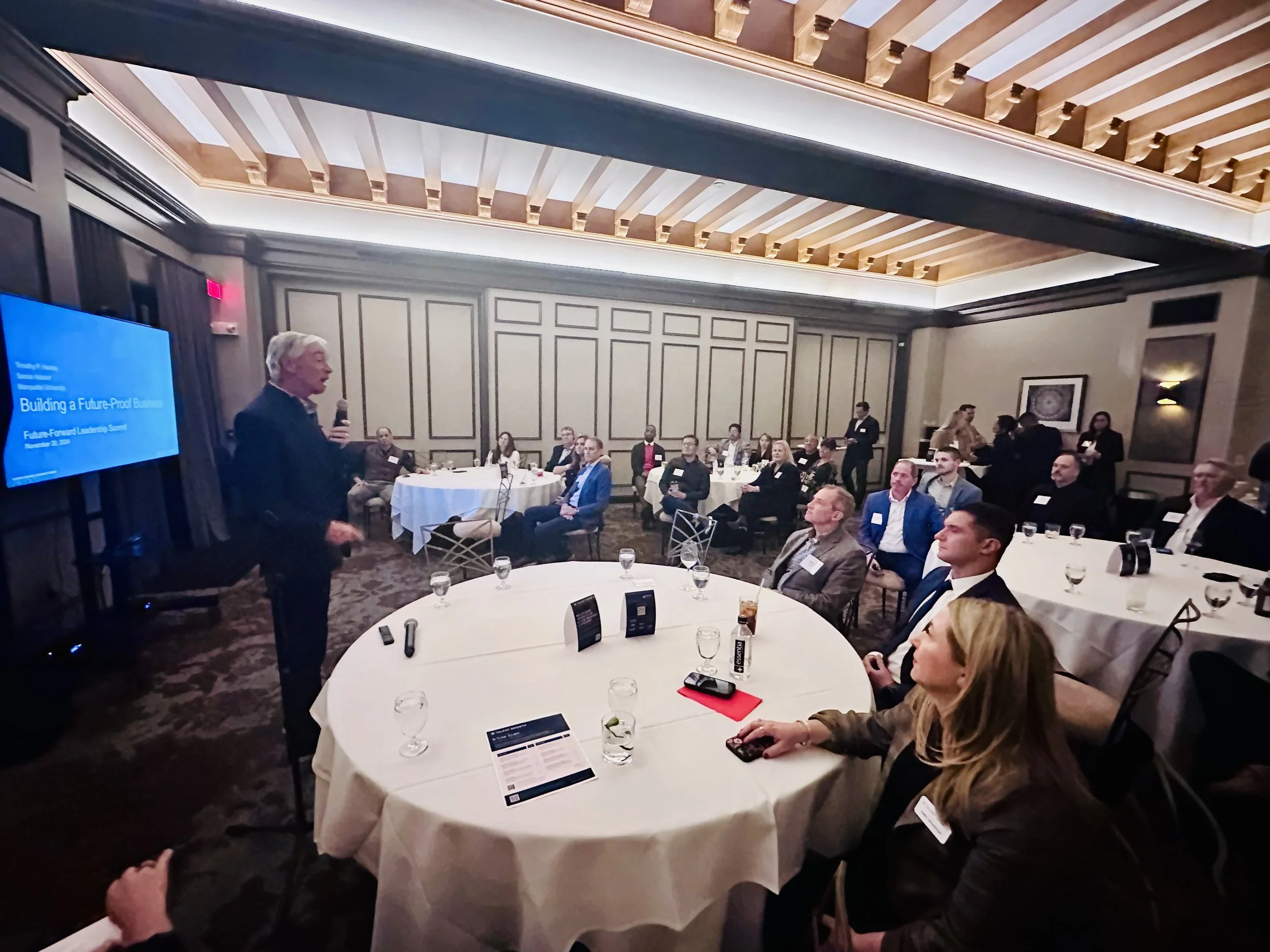The Future-Forward Leadership Summit, co-hosted by Talent Growth Partners and Roers Companies, brought together top leaders to share strategies for building resilient, high-performing teams and driving sustainable business growth.
For those who couldn’t join us—or if you’d like to revisit what we covered—this recap highlights the 8 most impactful lessons from the event. These takeaways will help you navigate challenges, empower your team, and position your organization for future growth.
8 Lessons to Build Future-Ready Teams
1. Resilience Starts with Agility
Tim Hanley, former Deloitte and Arthur Andersen executive and current Senior Advisor for the Office of University Relations at Marquette University, emphasized that the ability to adapt quickly to change is a defining feature of resilient businesses. Companies that anticipate risks and empower their teams to respond effectively are better positioned to thrive.
"Those companies that embraced change and emboldened their employees to adapt became the most resilient and successful," he said.
Try This: Regular scenario planning can help your team anticipate potential disruptions and identify opportunities to pivot when necessary. Ask yourself: Is my team prepared to act quickly when faced with unexpected challenges?
2. Leadership in the Future is About Enabling, Not Controlling
Julie Ugalde, CFO at Madison Air, highlighted a fundamental shift in leadership: the role of leaders is no longer to control but to enable their teams to act with confidence. This means fostering trust, empowering decision-making, and ensuring teams are equipped with the tools and information they need to succeed.
"Leadership in the future looks like enabling—disseminating trust, empowering decision-making, and ensuring the organization is well-informed to act effectively," Julie shared.
Actionable Tip: Build trust by delegating authority and empowering leaders at every level to make informed decisions. This approach not only drives agility but also creates a culture of accountability.
3. Talent Growth and Development Are Critical
Jorge Azevedo, CEO of Fermented Food Holdings, reminded us that talent growth is the cornerstone of organizational success:
"The biggest challenge I have for the future is talent growth and development. Our business is changing so fast, and having leaders capable of developing the next layer of leaders and decision-makers is critical."
Take Action: Develop a strong leadership pipeline by combining mentorship programs, leadership training, and clear career paths.
4. Turning Crisis into Opportunity
Julie Ugalde shared an inspiring story of turning a major challenge into a moment of transformation.
"In every crisis, there’s an opportunity to rebuild stronger than before—it just takes focus and the courage to act," she said.
Her team’s ability to remain clear-eyed and decisive after a significant operational disruption turned a potential setback into a streamlined, more effective process.
Takeaway: Prepare for potential crises by developing contingent plans. This ensures your team can act decisively when unexpected challenges arise.
5. Committing Fully to the Plan
Jorge Azevedo drew a lesson from his hobby of canyoneering, underscoring the importance of committing fully to a plan once it’s in motion.
"Do your research, have a strong plan, and then work the plan fully. Adjusting constantly once you’ve started only creates unnecessary risk," Jorge advised.
Ask Yourself: Are you fully committing to your organization’s strategic plans, or are frequent adjustments hindering progress? Success often comes from executing the plan with focus and discipline.
6. Continuous Improvement Through Reflection
Mark Boutelle, former ITW Group President and current Executive Chairman of GP Industries, LLC, offered a valuable reminder about the importance of reflection in leadership.
"It’s not about blaming—it’s about discerning what’s working and what’s not, and using that to continuously improve," Mark shared.
He also emphasized the 80/20 rule, which many attendees found particularly helpful. By focusing on the 20% of efforts that drive 80% of results, leaders can prioritize effectively and maximize impact.
Start Now: Conduct regular post-project reviews to assess strengths and opportunities for improvement. Use the 80/20 rule to identify where to focus your team’s energy for the greatest return.
7. Leveraging Technology to Empower Talent
Tim Hanley and other panelists emphasized that technology is not just a tool—it’s a multiplier for talent. Predictive analytics, AI, and digital platforms are transforming how organizations approach decision-making and team alignment.
"It’s not just about tools; it’s about talent. Companies are realizing they need individuals who can use advanced analytics and digital tools to create competitive advantages," Tim shared.
Consider This: Are you leveraging the full potential of your technology investments? Ensure your team is equipped to use advanced tools effectively to make data-driven decisions.
8. The Importance of Contingent Plans
Mark Boutelle stressed the need for contingency planning, reminding attendees of the value of being prepared for multiple outcomes.
"The best strategies include contingency plans that allow you to pivot quickly when the unexpected happens," he said.
Pro Tip: As you develop your strategic plans, include multiple scenarios that account for both positive and challenging outcomes. Teams that plan for flexibility can adapt with less disruption.
What Does This Mean for You?
Building future-ready teams takes intentional effort, clear strategy, and the willingness to adapt. Whether you’re developing your next generation of leaders, navigating change, or strengthening your team’s alignment, these lessons provide a framework for action.
If these ideas sparked new insights—or reminded you of practices you’ve been meaning to revisit—now is the time to take the first step.
What’s Next?
Read More: Download our free guide, 8 Actionable Steps to Strengthen Your Team and Fuel Growth.
Schedule a Consultation: Connect with Maria Nicholas-Groves to explore strategies tailored to your organization’s goals.
Thank you to everyone who attended the Future-Forward Leadership Summit and contributed to these meaningful discussions. If you couldn’t make it, we hope these insights inspire you to take your leadership and team strategies to the next level.





